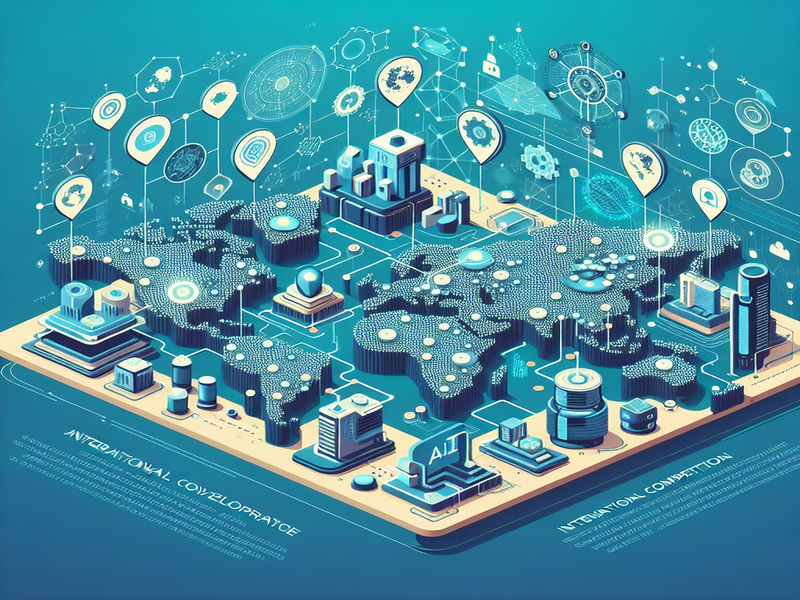- Updated: April 7, 2025
- 4 min read
The Rapid Growth and Competitive Landscape of the AI Industry
AI Industry Growth: Revolutionizing the Future of Technology
The artificial intelligence (AI) industry has witnessed unprecedented growth over the past few years, transforming various sectors and reshaping the future of technology. As AI continues to evolve, it plays a pivotal role in driving innovation, enhancing efficiency, and opening new avenues for businesses worldwide. In this article, we delve into the factors contributing to the AI industry growth, highlight key players, discuss technological advancements, and explore the implications for jobs and investments.
Key Players and Competition
The AI landscape is dominated by tech giants such as OpenAI, Google, and Meta, each striving to outpace the others in developing cutting-edge AI technologies. OpenAI, known for its groundbreaking work in AI models like GPT-3 and GPT-4, continues to push the boundaries of what’s possible. Meanwhile, Google is leveraging its vast resources and data capabilities to remain at the forefront of AI research and development. Meta, formerly Facebook, is investing heavily in AI to enhance its social media platforms and virtual reality experiences.
These companies are not alone in the race. China’s DeepSeek and other emerging players are also making significant strides, contributing to a global AI ecosystem characterized by intense competition and collaboration. For more insights into AI advancements, explore the AI-powered chatbot solutions on the UBOS platform.
Advancements in AI Technology
Recent advancements in AI technology have been nothing short of remarkable. From natural language processing to computer vision, AI is becoming increasingly sophisticated and capable of performing complex tasks with greater accuracy. One notable development is the integration of OpenAI ChatGPT integration, which enhances conversational AI by enabling more human-like interactions.
Additionally, the rise of generative AI models is revolutionizing content creation, design, and even software development. The UBOS platform offers tools and resources to harness the power of generative AI for innovation. These advancements are not only transforming industries but also paving the way for new business models and opportunities.
Impact on Jobs and Investments
As AI technology continues to evolve, its impact on the job market and investment landscape is becoming increasingly apparent. On one hand, AI is automating routine tasks, leading to concerns about job displacement. On the other hand, it is creating new roles and opportunities in fields such as AI research, development, and implementation. Businesses are investing heavily in AI to gain a competitive edge, with venture capital flowing into AI startups and projects at an unprecedented rate.
For businesses looking to integrate AI into their operations, the UBOS solutions for SMBs provide scalable and cost-effective options. Additionally, the February product update on UBOS highlights enhancements in AI bot interactions that can streamline business processes.
AI Safety and AGI Concerns
As AI systems become more powerful, concerns about AI safety and the potential development of artificial general intelligence (AGI) are gaining prominence. Ensuring that AI technologies are used responsibly and ethically is crucial to prevent unintended consequences. Organizations like OpenAI are actively researching AI safety measures to mitigate risks associated with advanced AI systems.
The Blueprint for an AI-powered future on UBOS provides valuable guidelines for businesses looking to adopt AI responsibly. By understanding the potential risks and implementing robust safety protocols, companies can harness the benefits of AI while minimizing potential downsides.
Conclusion and Future Outlook
The future of the AI industry is bright, with continued growth and innovation on the horizon. As key players like OpenAI, Google, and Meta continue to push the envelope, we can expect to see even more groundbreaking advancements in AI technology. The impact on jobs and investments will be profound, offering both challenges and opportunities for businesses and individuals alike.
For those interested in exploring the latest AI solutions and integrations, the ChatGPT and Telegram integration on the UBOS platform offers a glimpse into the future of conversational AI. As the industry evolves, staying informed and adaptable will be key to thriving in this dynamic landscape.
In conclusion, the AI industry is at the forefront of technological innovation, driving significant changes across various sectors. By embracing these advancements and addressing safety concerns, we can unlock the full potential of AI to create a more efficient, productive, and equitable future.

 From vibe coding to vibe deployment. UBOS MCP turns ideas into infra with one message.
From vibe coding to vibe deployment. UBOS MCP turns ideas into infra with one message. 